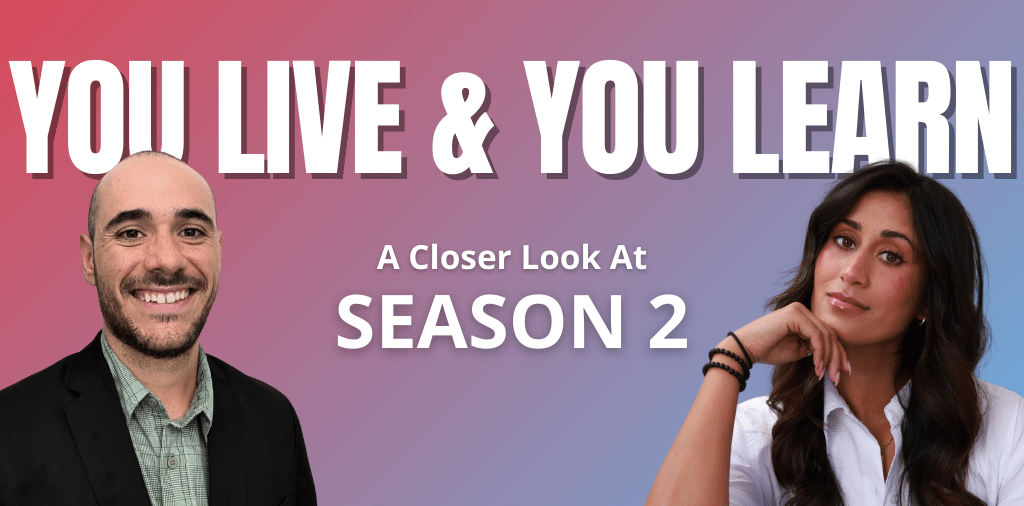Resilience: From Corporate America to the Bobsled Track

Lauren Gibbs seems fearless. When you watch her TEDx talk, it’s easy to think she’s effortlessly courageous and resilient. Hearing her reflect back on her experience of becoming an Olympic silver medalist in bobsled, it sounds like she took the huge leap from her 6-figure corporate job to the U.S. Olympic bobsled team without a second thought.
However, when you dive deeper into her story, it becomes clear that her decisions were not simple or easy and she overcame a lot of fear. At her lowest point, she made a personal commitment to herself that made all the difference: she promised herself that she would fully consider and analyze any opportunity that came her way.
Through this strong personal commitment to herself and perseverance in hard times, she confronted her fears and doubts and took a risk that completely changed her trajectory and resulted in a surprising and fulfilling career.
She has become an expert on managing change by handling adversity, tackling weaknesses, and cultivating resilience to reach her goals.
Defining success in corporate leadership and bobsled
Gibbs grew up with what she thought was a clear understanding of the “right” path to success. She got an Ivy League education at Brown. She earned her MBA at Pepperdine University, and then got a corporate job, steadily moving up in the ranks.
During her brief period of unemployment, Gibbs took a good look at her surroundings and decided to take action.
Little did she know, her ascent to a high-level sales position was preparing her for the struggles and challenges of elite bobsledding.
“I like to say that my story to the Olympics starts back when I was 27, sitting on a couch in San Diego, having been fired in the middle of a recession in 2008.”
At that moment, Gibbs made a commitment to herself: to seriously consider any opportunity that was presented to her. “Doing something has to be better than doing nothing.”
With this attitude, she found her way to a new job as a sales manager. Getting the job wasn’t the only challenge, though. “It was corporate America, I was 27 years old, all of my sales reps were older than me, and male. There was a lot to overcome, as far as getting people to trust me, and really trying to figure out what kind of leader I was.” She worked hard to gain their trust and confidence.
From boardroom to bobsled: Putting resilience to the test
Once Gibbs had ascended to a regional sales director role, “I was making six figures and was comfortable.”
It got to a point, though, where things stopped making sense. “I felt like I’d worked really hard to get to a place where the things I was doing at work on a daily basis were not fulfilling. If the thing I’m doing 8 hours a day isn’t fulfilling…what am I doing?” She felt compelled to make a change.
First, she took a small risk by getting a job at a small startup that “was much better suited to my desire to be creative and build something.”
Around that time, though, a friend, Jill Potter (a member of the 2016 U.S. Olympic rugby team) recommended that Gibbs try out for the bobsled team. She knew Gibbs had strength and track and field experience and felt that she could handle the rest.
Gibbs was 30 years old and had not played competitive sports since college volleyball when she was 22. “Trying to do a sport at such an elite level that I could go to the Olympics seemed unattainable. I didn’t do great at the tryouts, but I did well enough to get invited to a rookie camp.”
She won the rookie competition and got invited to the National Push Championship, where she tied for second behind Olympic gold medalist Lauryn Williams, and was selected for the national team.
Gibbs went on to win a silver medal with pilot Elana Meyers Taylor in PyeongChang and is now in her fifth year of living as a full-time athlete. Read on to learn four key lessons about being a resilient leader.
1. Embrace Uncertainty by Putting in The Work
Gibbs’ sales leadership skills and ability to work with a team translated to bobsled more than expected. “I think what my corporate leadership experience taught me was how to work with people in tough situations, under stress, under fire.”
No matter how resilient you are, change and uncertainty can be terrifying. This is especially true if you’re not sure how everything will ultimately work out.
However, Gibbs says, change is inevitable. The more you’re exposed to, the better you’ll handle it. The more resilience you will have.
Strategic, clear-headed thinking is key in moments of change, whether you’re in the boardroom or on the bobsled track. “You have to work hard and be willing to really dig in and learn the position, and learn how you can make an impact.”
2. Weigh The Risks and Envision The Worst-Case Scenario
Many leaders choose to envision only positives. But, defining the worst-case scenario can actually give you a sense of control and resilience when it comes to taking a big risk.
Gibbs knew what she would do if her bobsled plans didn’t work out. “I figured, even if it only lasted one season, or I didn’t like it, it would be at least be a good story to tell.”
She recognized that she had an incredibly unique opportunity in front of her. “How many people get to try bobsled? Not very many.”
Think about a leadership challenge currently facing you or your team. What’s the worst that could happen if you took the riskier path? What’s the minimum benefit that you’d need to make it worth it? For Gibbs, defining success as “just giving it a try” eased the pressure, lowered the stakes, and made her more resilient in the face of adversity.
She also had confidence in her background and knew what she could fall back on if things didn’t work out.
“I’m good at sales management and leadership and knew I could go back to those if needed. But, leaving a position that I didn’t fully enjoy in order to pursue a rare opportunity was too compelling to ignore.”
3. Recognize What You Can Control
Gibbs’ perseverance and resilience through good times and bad come from her intense focus on what she can control, and her ability to let go of what she can’t control.
“The idea of things not being the way you want them in your current life is something that is hard for anyone to accept. But if I look back at the defining moments in my life and try to map out how I got to where I am today, a lot of those tougher experiences are why I was able to be successful in bobsled.”
As an Olympic athlete, Gibbs has very little control over whether or not things work in her favor. “What I can control is how hard I work, how I respond to adversity, and how I put myself in a position to be seen as the right choice as an athlete.”
To illustrate this lack of control, she tells the story of the pilot with whom she went to the Olympics. “A week before we left for the Olympics, she partially tore her Achilles tendon. We were still able to win silver and were only seven-hundredths of a second out of gold medal position.”
“Things didn’t always go the way that I thought they would. Every time something doesn’t go your way, you have a decision to make. You can act and fight through it or react negatively and let it completely derail you. Or you can choose to give up. It’s all your choice.”
You can cultivate resilience by recognizing what’s inside your control and what you have no power over.
4. Reflect On and Analyze Your Performance
As a leader, reflection can be your secret advantage for repeated success. Constantly analyze your performance. “When things go well, try to figure out why they went well.”
“I think a big reason that I made it to the Olympics is that every time something got hard, I chose to focus on what I could do better. Then I really focused on that specific thing. It was amazing how much easier it became to tackle my weaknesses when I just stopped being afraid of them.”
To apply these lessons, stop and evaluate the challenges currently facing you and your organization. Then consider what is outside your ability to control. Ask yourself what could potentially go wrong in the situation. When you show resilience and can persevere through change, you’ll be much closer to success.
An Olympic medal may not be part of your future plans. But, the right mix of hard work, resilience, and perseverance can help you work toward both team and individual goals.
Partner with WDHB to learn more valuable leadership lessons from elite athletes and coaches about taking risks and persevering through change. If your team desires to be more agile and resilient, contact us to learn more about customizing a Leadership Experience.
Author
Subscribe to get Access to Exclusive Content





